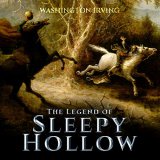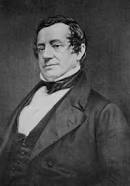The Legend of Sleepy Hollow Page #5
"The Legend of Sleepy Hollow" is a gothic story by American author Washington Irving, contained in his collection of 34 essays and short stories entitled The Sketch Book of Geoffrey Crayon, Gent.. Written while Irving was living abroad in Birmingham, England, "The Legend of Sleepy Hollow" was first published in 1820.
Such was the formidable rival with whom Ichabod Crane had to contend, and, considering all things, a stouter man than he would have shrunk from the competition, and a wiser man would have despaired. He had, however, a happy mixture of pliability and perseverance in his nature; he was in form and spirit like a supple-jack--yielding, but tough; though he bent, he never broke; and though he bowed beneath the slightest pressure, yet, the moment it was away--jerk!--he was as erect, and carried his head as high as ever. To have taken the field openly against his rival would have been madness; for he was not a man to be thwarted in his amours, any more than that stormy lover, Achilles. Ichabod, therefore, made his advances in a quiet and gently insinuating manner. Under cover of his character of singing-master, he made frequent visits at the farmhouse; not that he had anything to apprehend from the meddlesome interference of parents, which is so often a stumbling-block in the path of lovers. Balt Van Tassel was an easy indulgent soul; he loved his daughter better even than his pipe, and, like a reasonable man and an excellent father, let her have her way in everything. His notable little wife, too, had enough to do to attend to her housekeeping and manage her poultry; for, as she sagely observed, ducks and geese are foolish things, and must be looked after, but girls can take care of themselves. Thus, while the busy dame bustled about the house, or plied her spinning-wheel at one end of the piazza, honest Balt would sit smoking his evening pipe at the other, watching the achievements of a little wooden warrior, who, armed with a sword in each hand, was most valiantly fighting the wind on the pinnacle of the barn. In the mean time, Ichabod would carry on his suit with the daughter by the side of the spring under the great elm, or sauntering along in the twilight, that hour so favorable to the lover’s eloquence. I profess not to know how women’s hearts are wooed and won. To me they have always been matters of riddle and admiration. Some seem to have but one vulnerable point, or door of access; while others have a thousand avenues, and may be captured in a thousand different ways. It is a great triumph of skill to gain the former, but a still greater proof of generalship to maintain possession of the latter, for man must battle for his fortress at every door and window. He who wins a thousand common hearts is therefore entitled to some renown; but he who keeps undisputed sway over the heart of a coquette is indeed a hero. Certain it is, this was not the case with the redoubtable Brom Bones; and from the moment Ichabod Crane made his advances, the interests of the former evidently declined: his horse was no longer seen tied to the palings on Sunday nights, and a deadly feud gradually arose between him and the preceptor of Sleepy Hollow. Brom, who had a degree of rough chivalry in his nature, would fain have carried matters to open warfare and have settled their pretensions to the lady, according to the mode of those most concise and simple reasoners, the knights-errant of yore,--by single combat; but Ichabod was too conscious of the superior might of his adversary to enter the lists against him; he had overheard a boast of Bones, that he would “double the schoolmaster up, and lay him on a shelf of his own schoolhouse;” and he was too wary to give him an opportunity. There was something extremely provoking in this obstinately pacific system; it left Brom no alternative but to draw upon the funds of rustic waggery in his disposition, and to play off boorish practical jokes upon his rival. Ichabod became the object of whimsical persecution to Bones and his gang of rough riders. They harried his hitherto peaceful domains; smoked out his singing school by stopping up the chimney; broke into the schoolhouse at night, in spite of its formidable fastenings of withe and window stakes, and turned everything topsy-turvy, so that the poor schoolmaster began to think all the witches in the country held their meetings there. But what was still more annoying, Brom took all opportunities of turning him into ridicule in presence of his mistress, and had a scoundrel dog whom he taught to whine in the most ludicrous manner, and introduced as a rival of Ichabod’s, to instruct her in psalmody. In this way matters went on for some time, without producing any material effect on the relative situations of the contending powers. On a fine autumnal afternoon, Ichabod, in pensive mood, sat enthroned on the lofty stool from whence he usually watched all the concerns of his little literary realm. In his hand he swayed a ferule, that sceptre of despotic power; the birch of justice reposed on three nails behind the throne, a constant terror to evil doers, while on the desk before him might be seen sundry contraband articles and prohibited weapons, detected upon the persons of idle urchins, such as half-munched apples, popguns, whirligigs, fly-cages, and whole legions of rampant little paper gamecocks. Apparently there had been some appalling act of justice recently inflicted, for his scholars were all busily intent upon their books, or slyly whispering behind them with one eye kept upon the master; and a kind of buzzing stillness reigned throughout the schoolroom. It was suddenly interrupted by the appearance of a negro in tow-cloth jacket and trowsers, a round-crowned fragment of a hat, like the cap of Mercury, and mounted on the back of a ragged, wild, half-broken colt, which he managed with a rope by way of halter. He came clattering up to the school door with an invitation to Ichabod to attend a merry-making or “quilting frolic,” to be held that evening at Mynheer Van Tassel’s; and having delivered his message with that air of importance, and effort at fine language, which a negro is apt to display on petty embassies of the kind, he dashed over the brook, and was seen scampering away up the hollow, full of the importance and hurry of his mission. All was now bustle and hubbub in the late quiet schoolroom. The scholars were hurried through their lessons without stopping at trifles; those who were nimble skipped over half with impunity, and those who were tardy had a smart application now and then in the rear, to quicken their speed or help them over a tall word. Books were flung aside without being put away on the shelves, inkstands were overturned, benches thrown down, and the whole school was turned loose an hour before the usual time, bursting forth like a legion of young imps, yelping and racketing about the green in joy at their early emancipation. The gallant Ichabod now spent at least an extra half hour at his toilet, brushing and furbishing up his best, and indeed only suit of rusty black, and arranging his locks by a bit of broken looking-glass that hung up in the schoolhouse. That he might make his appearance before his mistress in the true style of a cavalier, he borrowed a horse from the farmer with whom he was domiciliated, a choleric old Dutchman of the name of Hans Van Ripper, and, thus gallantly mounted, issued forth like a knight-errant in quest of adventures. But it is meet I should, in the true spirit of romantic story, give some account of the looks and equipments of my hero and his steed. The animal he bestrode was a broken-down plow-horse, that had outlived almost everything but its viciousness. He was gaunt and shagged, with a ewe neck, and a head like a hammer; his rusty mane and tail were tangled and knotted with burs; one eye had lost its pupil, and was glaring and spectral, but the other had the gleam of a genuine devil in it. Still he must have had fire and mettle in his day, if we may judge from the name he bore of Gunpowder. He had, in fact, been a favorite steed of his master’s, the choleric Van Ripper, who was a furious rider, and had infused, very probably, some of his own spirit into the animal; for, old and broken-down as he looked, there was more of the lurking devil in him than in any young filly in the country.
Translation
Translate and read this book in other languages:
Select another language:
- - Select -
- 简体中文 (Chinese - Simplified)
- 繁體中文 (Chinese - Traditional)
- Español (Spanish)
- Esperanto (Esperanto)
- 日本語 (Japanese)
- Português (Portuguese)
- Deutsch (German)
- العربية (Arabic)
- Français (French)
- Русский (Russian)
- ಕನ್ನಡ (Kannada)
- 한국어 (Korean)
- עברית (Hebrew)
- Gaeilge (Irish)
- Українська (Ukrainian)
- اردو (Urdu)
- Magyar (Hungarian)
- मानक हिन्दी (Hindi)
- Indonesia (Indonesian)
- Italiano (Italian)
- தமிழ் (Tamil)
- Türkçe (Turkish)
- తెలుగు (Telugu)
- ภาษาไทย (Thai)
- Tiếng Việt (Vietnamese)
- Čeština (Czech)
- Polski (Polish)
- Bahasa Indonesia (Indonesian)
- Românește (Romanian)
- Nederlands (Dutch)
- Ελληνικά (Greek)
- Latinum (Latin)
- Svenska (Swedish)
- Dansk (Danish)
- Suomi (Finnish)
- فارسی (Persian)
- ייִדיש (Yiddish)
- հայերեն (Armenian)
- Norsk (Norwegian)
- English (English)
Citation
Use the citation below to add this book to your bibliography:
Style:MLAChicagoAPA
"The Legend of Sleepy Hollow Books." Literature.com. STANDS4 LLC, 2024. Web. 22 Dec. 2024. <https://www.literature.com/book/the_legend_of_sleepy_hollow_261>.




Discuss this The Legend of Sleepy Hollow book with the community:
Report Comment
We're doing our best to make sure our content is useful, accurate and safe.
If by any chance you spot an inappropriate comment while navigating through our website please use this form to let us know, and we'll take care of it shortly.
Attachment
You need to be logged in to favorite.
Log In